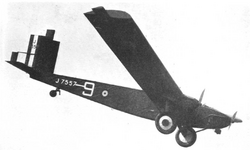RAF Mousehold Heath was a Royal Air Force station on Mousehold Heath near Norwich. The area between the Salhouse and Plumstead roads (outside of the outer ring road) was originally the Cavalry Training Ground. It became the Royal Flying Corps Mousehold Heath aerodrome during the First World War and was the location where Boulton & Paul, among other local manufacturers, passed over the aircraft they had built into the hands of the RFC. It was sometimes also known as Norwich aerodrome by the RFC On the formation of the RAF in April 1918, it became "Royal Air Force Mousehold Heath".
| RAF Mousehold Heath Mousehold Aerodrome | |||||||
|---|---|---|---|---|---|---|---|
| Near Norwich, Norfolk in England | |||||||
 Beardmore Inflexible aircraft at the Norwich Air Display, Mousehold Aerodrome, May 1929 | |||||||
| Coordinates | 52°38′36″N 001°20′02″E / 52.64333°N 1.33389°E | ||||||
| Type | Royal Air Force station | ||||||
| Site information | |||||||
| Owner | Air Ministry | ||||||
| Operator | Royal Air Force | ||||||
| Site history | |||||||
| Built | 1916 | ||||||
| In use | 1916-1933 | ||||||
| Airfield information | |||||||
| Elevation | 39 metres (128 ft) AMSL | ||||||
| |||||||
After the war, Boulton and Paul continued to use the site. The Norwich & Norfolk Aero Club was formed at the airfield in 1927 which then became the first Norwich Airport in 1933. The airfield fell into disuse during the Second World War and has now mostly been redeveloped for housing.
History
editBoulton & Paul was a Norwich general construction firm working in metal and wood. In 1915 they approached the government offering their services for production of war materiel. They gained a trial contract for 25 Royal Aircraft Factory FE.2b At the time, an Aircraft Acceptance Park for aircraft being produced in Norfolk was under construction by the War Department near Thetford about 25 miles away. Rather than deliver aircraft there, Boulton & Paul suggested putting an aerodrome on the Cavalry Drill Ground to the north of Norwich.[1] This was accepted and Boulton & Paul gained a contract for the buildings to house an RFC School of Flying on the new aerodrome; No. 9 Reserve Aeroplane Squadron was formed there in July 1915. In October 1915, the first aircraft built by Boulton & Paul, a FE2b serial 5201 and marked "Bombay No.1" flew from Mousehold.[2]
As aircraft output increased the aerodrome was extended, with more buildings built by Boulton & Paul. In 1917, the RFC established Norwich Aircraft Acceptance Park, later named No. 3 (Norwich) Aircraft Acceptance Park at Mousehold to take aircraft from other local manufacturers as well, this included Portholme Aircraft Company, Mann Egerton and Ransomes, Sims & Jefferies.[3] Ransomes based in Ipswich had their aircraft works built by BP and been given BP's jigs and templates for FE2 construction when BP moved to building the Sopwith Camel.[4]
In 26 July 1919 the acceptance park became the Norwich Storage Park.
The following squadrons and units were posted here at some point:
| Unit | Dates | Aircraft | Notes |
|---|---|---|---|
| No. 18 Squadron RFC | August–November 1915 | Vickers FB 5 | Operated the Bristol Scout, Martinsyde S.1 and Farman Shorthorn for training before moving to France in November 1915 with the Vickers FB 5.[5] |
| No. 37 Squadron RFC | 15–16 April 1916 | Formed at Norwich from elements of 9 RS before moving on the next day to Orfordness.[5] | |
| No. 85 Squadron RFC | August–November 1917 | Various | [5] |
| No. 117 Squadron RAF | July–November 1918 | Airco DH.9 | Operated various aircraft for training before gaining the DH.9s in October 1918.[5] |
| No. 40 Elementary and Reserve Flying Training School RAF | August–September 1939 | Miles Magister | Operated by Air Contractors Limited and also used the Hawker Audax and Hawker Hind.[6] |
| No. 3 (Training) Group Navigation School | July–November 1919 | Airco DH.9 | [7] |
No. 3 Group headquarters was located at Mousehold Heath between July and November 1919.[8]
Current use
editSeveral original buildings remain in industrial use, including hangars and other buildings on the Salhouse Industrial Estate. Part of the flying field survives as the playing field for the Open Academy, formerly Heartsease High School.[9]
See also
editNotes
editReferences
edit- Jefford, C.G. (1988). RAF Squadrons. Airlife Publishing Ltd. ISBN 1-85310-053-6.
- Sturtivant, Ray (2007). RAF Flying Training and Support Units since 1912. Air-Britain. ISBN 978-0-85130-365-9.
- Brew, Alec (1993). Boulton Paul Aircraft since 1915. Putnam.
